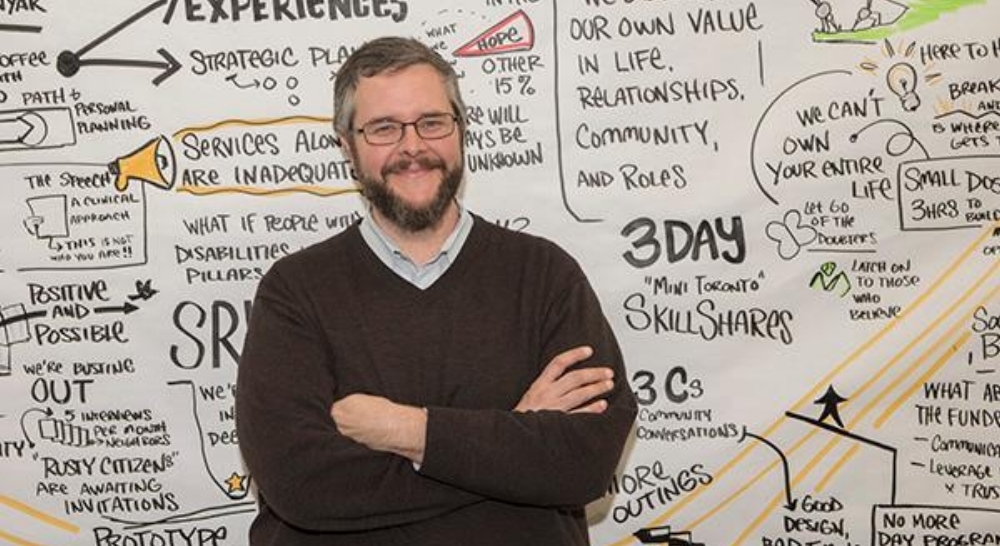New Olmstead Consent Decree Monitor Wants Reality Check On RI DD System Transformation
/A. Anthony Antosh * Photo By Anne Peters
By Gina Macris
As the new federal monitor of a 2014 civil rights consent decree affecting Rhode Islanders with developmental disabilities, A. Anthony Antosh wants to get a reality check on where reform efforts now stand and to create a road map for what remains to be done to enable people to live inclusive lives, in accordance with the U.S. Supreme Court’s Olmstead Decision on the Integration Mandate of the Americans With Disabilities Act.
Antosh’s vision, which parallels the requirements of the consent decree is that:
Adults with developmental disabilities who once spent their days in sheltered workshops or day care centers will have a chance to work at regular jobs and will be able to do whatever non-work activities they want in the community- with the needed supports.
Teenagers and those in their early twenties still in school, who are also protected by the consent decree, will get the services they need to make a smooth transition to the world of work and adulthood.
The process for assessing how far the state has moved toward inclusion includes not only a look at the state’s compliance with the consent decree’s prescribed goals, or “benchmarks,” but at the impact on the people’s lives as well, Antosh said.
For example, the state’s “Person-Centered Supported Employment Performance Program” tries to boost the number of people who get hired to bring the state into compliance with target job numbers specified in the consent decree. Antosh says he wants to find out if meeting those target employment numbers also means that everyone who wants to work has a chance to get a job.
Antosh outlined his vision at a Dec. 17 meeting in Warwick with the Employment First Task Force (EFTF), a community-based committee empowered by the consent decree to serve as an advisory group to state government and federal officials.
After his appointment as monitor by U.S. District Court Judge John J. McConnell, Jr., Antosh said, “a lot of people wanted to give me advice but lots of people felt their voices had not been heard. I want them to be heard.”
Antosh said he can’t process calls and emails from all of the thousands of Rhode Islanders with a stake in developmental disability services, but over the next couple of months he wants to hear from as many people as possible.
He turned to EFTF to help him collect and analyze the information in the next few months because its 15 members have broad and deep connections to the various constituencies with a connection to the developmental disability service system as consumers, families or professionals.
The EFTF membership represents non-profit organizations like the RI Developmental Disabilities Council, the Sherlock Center on Disabilities at Rhode Island College, Advocates in Action, Disability Rights Rhode Island, and includes a delegate from the state’s special education directors, the leaders of a statewide developmental disability professional organization, family members with ties to advocacy groups, service providers and adults who themselves receive state supports.
In the next two months, Antosh said, he wants the EFTF members to ask these questions of their constituencies:
Has life improved as a result of the consent decree reforms already in place?
What changes must yet be made?
What will a transformed system look like to them?
Right now, Antosh said, he could go around a room and get a different answer from everyone on “where we are now.”
“I want many data points to know it has changed,” said Antosh, drawing on his background as a researcher and educator in developmental disability and special education issues. Antosh was the original director of the Sherlock Center at Rhode Island College, serving from 1993 until two months ago (check.)
Early in his career, he was one of the plaintiffs the lawsuit that forced the state to close its institution for people with disabilities, the Ladd School. It was shuttered in 1994. And the judge who now presides over the consent decree case, John J. McConnell, Jr., was a young lawyer who represented the plaintiffs in the Ladd school suit, Antosh among them.
Antosh said he has consulted with McConnell on his grass roots, fact-gathering approach. He said he will “do nothing without consultation with the judge.”
McConnell appointed Antosh interim court monitor November 25 to end a stalemate of more than four months between the state and the U.S. Department of Justice on the selection of a replacement to the original consent decree monitor, Charles Moseley, who stepped down for health reasons.
At the EFTF meeting, Antosh, now entering his 51st year in the disabilities field, outlined some of his core beliefs:
• Equity. If an opportunity is available to one, it should be available to all, he said.
• Policy backed by research. He said he has seen well intentioned people putting forward well-intentioned policies which have no impact on people’s lives because there’s no research or evidence to indicate they will work.
• Individualization. Antosh said he has seen many plans for an individualized program of services with information on the goals but no steps outlined on how those goals should be reached. “I believe in real plans,” he said.
• Individual control. People with developmental disabilities and their families can spend their allocation much better if they control it, Antosh said.
Overall, Antosh signaled that he wants flexibility in the system to enable the individualization that is at the heart of the consent decree. “I struggle with rigid anything,” he said.









